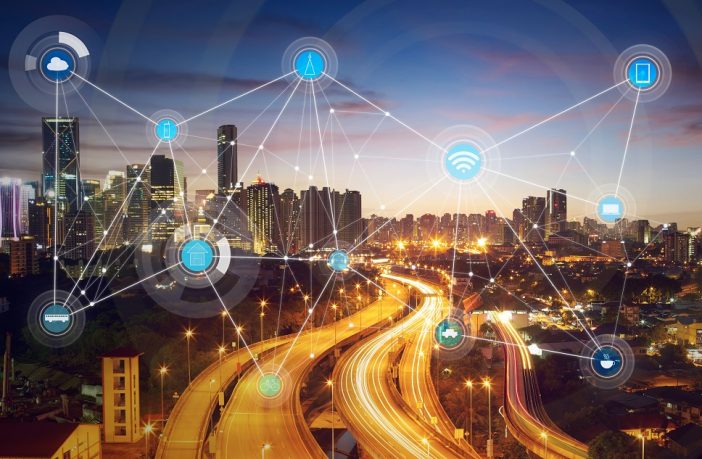The Open University is at the forefront of examining how ‘smart cities’ work. But what is a smart city? Do you know if you live in one? And how might they change how we live and work in the future?
Dr Oliver Zanetti and Professor Sophie Watson – who appear on Radio 4’s Thinking Allowed on Wednesday 25 July at 4pm talking about this – explain what a smart city is and what kinds of things could happen there.
What is a ‘smart city’?
The concept of a smart city is to use technology and the huge amounts of data it generates to make cities work better for the people in them. This data, known as ‘big data’, can be collected on all sorts of things: traffic flow, energy use, pollution, income inequality – almost anything that can be measured in fact.
The aim of smart city technologies is to bring that data together and do something useful with it. With today’s powerful computing this often happens immediately, or in other words, in ‘real time’. Traffic data might help you get to work more quickly; energy use and pollution data could help us all to use resources more efficiently; other data might help citizen groups to campaign for new social services.
Dr Oliver Zanetti says: “This is an exciting time for cities, and no one really knows what the future holds. In 50 years, I think, in many ways, our cities will look much the same, with the same buildings and streetscapes. But some aspects of our daily life will have changed beyond recognition. How? Who knows? But certainly, they will be a lot smarter.”
Here’s Professor Gillian Rose, part of the research team, introducing the concept of a smart city:
What places are smart cities?
Around a third of UK cities have plans to become ‘smarter’ and each plans to do this in its own way – a way which depends on how the city is now, as much as it does on the smart technologies which could be installed in it. Around the globe, places like London, Barcelona, Rio de Janeiro, Singapore, and New York all make use of smart city tech.
Milton Keynes, where The Open University main campus is based, aims to be a smart city.
Do citizens know they live in a smart city? Does that matter?
Dr Zanetti says:
“Because the world of technology moves so fast, what seems like the latest technology one day can look obsolete the next. As a result, there’s no official definition for a smart city. But that isn’t necessarily a problem.”
In this video, Dr Zanetti explains more about how citizens engage with smart cities:
Citizens can often see smart city projects going on around them, and they can even become part of everyone’s life without anyone noticing. For example, letting your phone direct you around a traffic jam is a use of smart technology that most people nowadays don’t even question. Some cities use sensors which monitor traffic flow and can change the phasing of traffic lights so that everyone moves around more easily and traffic causes less pollution.
What kinds of things will technology do in a smart city?
The kinds of things technology can help with are diverse.
Take litter bins – perhaps rather than having rubbish lorries driving around emptying all the bins on a single route, what if each bin could ‘tell’ the street sweepers to come only when they need emptying? Then the council could target its staff to only go where they were needed; saving time and keeping the city cleaner. This concept is already being trialed in Milton Keynes.
Also in Milton Keynes, the concept of self-driving cars is being developed. They could navigate traffic efficiently and reduce congestion – they could also always be on the road moving people around, so we wouldn’t need to waste precious city space with car parks.
In Singapore, mobile phone apps have been developed to report municipal issues with geo-tagging, to access personal health records and to plan transport routes.
Drawing on research from London, Professor Sophie Watson has been investigating how water is being consumed ‘smartly’ in smart cities to reduce household and business water consumption. You can learn more about her research in this short video:
Glasgow has experimented with a Cycling App, which collects data about how cyclists travel around the city. The aim is to use this data to plan new cycling infrastructure based on the routes people actually take, rather than building cycle lanes along roads that cyclists don’t use.
How will my data be used and stored?
Dr Zanetti says: “This is an important question, given that big data underpins most smart city technologies. Let’s look again at that example of travel data to think about this question.
“Rules exist which insist that personal data is securely stored and only used for the purposes which it was collected for and for which consent was given. The consent form for storing cookies on our computers by websites are an example of this. So our starting point is that we can feel confident that our personal data is being used and stored responsibly.
“However, a lot of smart city data doesn’t look like personal data in that it doesn’t contain any personal details like name or age. But that data can be used to infer details about people. For example, data that shows your driving pattern can tell someone where you live and work, allowing them to make a good guess about your income as well as the times you’re in and out of the house. It might also show where you socialise, from which it could be possible to work out other things like age, gender, religion, ethnicity, and sexuality. With all that information, connecting anonymous driving data to a named individual wouldn’t be too hard.”
For smart city planners, this individual data is not very useful. Big data is about amalgamating everyone’s activities and looking for patterns. Smart city tech companies are interested in the overview, not in being bogged down looking at individuals. But that doesn’t mean that this individual data ceases to exist.
Though some smart cities have central data hubs for data which is shared, other data is collected and used by small and large companies and local and national government too. It’s a fragmented landscape. As smart city technologies become increasingly common, new debates will need to take place about the usage and storage of the data the smart city is based on.
Do we trust those collecting data about us to store it securely? What if we don’t want to be individually identified? Will it ever be possible to remove ourselves from this global dataset, if we should wish to do so in the future?
What about cyber security?
Cyber security is growing in importance as digital technology plays an ever increasing role in our everyday life. Cities and smart city technology makers will need to find ways to protect cities from cyber attacks that intend to disrupt how the city functions, and protect everyone’s data from theft.
Dr Zanetti said: “Because smart city technology is so new, there isn’t yet one answer to this concern. For the multinational companies working in the field, strong cyber security is important to protect their reputation. Other technologies are often quite experimental, so they’re not yet widespread enough to be of interest to hackers.”
But as smart city technologies become more common, cyber security will only grow in importance. The risks from hacking an autonomous vehicle, for example, are huge.
What about citizens who don’t use technology, or who are disabled?
Oliver Zanetti continues: “Most smart technologies require the use of a smartphone or computer; and although most people now have these available, they could be out of reach for some, who perhaps can’t afford them or who lack digital experience. This is an important concern. We risk excluding people from participating in the places that they live if the only way to interact with city services is through expensive or hard to use technologies.
“There is also the consideration of people with disabilities. For example, the ‘interface’ or connection between a person and technology is very often through a screen. For those who are blind or partially-sighted this can be challenging or impossible. It can also be very hard for people who have mobility difficulties like Parkinson’s. The use of text could exclude those who are dyslexic.”
New interfaces that use spoken language rather than the screen can help out in these cases. What’s more, smart city technology has the potential to be really useful to some disabled people. Smartphone apps exist that help guide visually impaired people around the city, and autonomous vehicles could really help elderly and disabled people.
It’s important that, as technologies are developed, accessibility is considered.
Researching
 Milton Keynes was home to MK:Smart, a £16million project led by the OU with partners across local government and businesses. It developed innovations to support economic growth in Milton Keynes, including the ‘MK Data Hub’, which manages the vast amounts of data needed by city systems – transport data, energy consumption and social datasets.
Milton Keynes was home to MK:Smart, a £16million project led by the OU with partners across local government and businesses. It developed innovations to support economic growth in Milton Keynes, including the ‘MK Data Hub’, which manages the vast amounts of data needed by city systems – transport data, energy consumption and social datasets.
Citizen education and innovation were core components of MK:Smart, as it was recognised that smart cities need to empower citizens to participate in initiatives by providing opportunities for learning, community-based innovation and active citizenship. The Education and Citizen Work Packages of MK:Smart engaged a global audience in learning about smart cities, influenced public policy on citizen innovation and digital literacy, and piloted new approaches to participatory design by co-creating smart city projects with residents in Milton Keynes.
Researchers are also looking at how smart cities are being made with the ‘Smart Cities in the Making’ project.
The CityLabs project is bringing data science researchers together with small businesses and entrepreneurs to help them develop companies in the fields of big data and the Internet of Things.
Find out more:
Study smart cities with free courses on FutureLearn and OpenLearn
Take a look at our resources on OpenLearn:
Smart cities in the making: learning from Milton Keynes
How is Milton Keynes a smart city?
Learn about urban data in the primary classroom with this research paper



